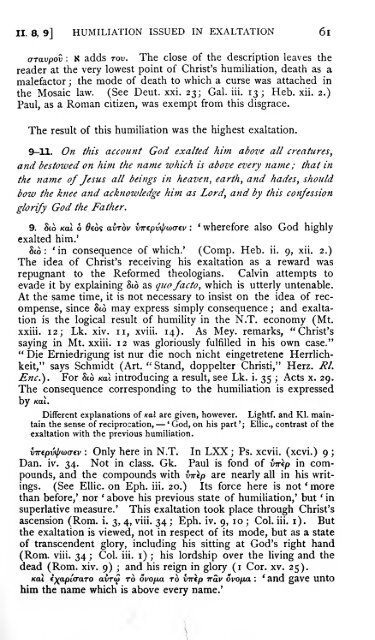Philippians and Philemon - MR Vincent - 1906.pdf
Philippians and Philemon - MR Vincent - 1906.pdf
Philippians and Philemon - MR Vincent - 1906.pdf
You also want an ePaper? Increase the reach of your titles
YUMPU automatically turns print PDFs into web optimized ePapers that Google loves.
II. 8, 9] HUMILIATION ISSUED IN EXALTATION 6<br />
): S adds . The close of the description leaves the<br />
reader at the very lowest point of Christ's humiliation, death as a<br />
malefactor ; the mode of death to which a curse was attached in<br />
the Mosaic law. (See Deut. xxi. 23; Gal. iii. 13; Heb. xii. 2.)<br />
Paul, as a Roman citizen, was exempt from this disgrace.<br />
The result of this humiliation was the highest exaltation.<br />
9-11. On this account God exalted him above all creatures^<br />
<strong>and</strong> bestowed on hitn the name which is above every name; that in<br />
the name of Jesus all beings in heaven, earth, <strong>and</strong> hades, should<br />
bow the knee <strong>and</strong> acknowledge him as Lord, <strong>and</strong> by this confession<br />
glorify God the Father.<br />
9. ^cos ^:<br />
exalted him.'<br />
' wherefore also God highly<br />
:<br />
' in consequence of which.' (Comp. Heb. ii. 9,<br />
The idea of Christ's receiving his exaltation as a reward was<br />
repugnant to the Reformed theologians. Calvin attempts to<br />
evade it by explaining as quo facto, which is utterly untenable.<br />
At the same time, it is not necessary to insist on the idea of recompense,<br />
since may express simply consequence ; <strong>and</strong> exaltation<br />
is the logical result of humility in the N.T. economy (Mt.<br />
xxiii. 12; Lk. xiv. 11, xviii. 14). As Mey. remarks, "Christ's<br />
1<br />
xii. 2.)<br />
saying in Mt. xxiii. 12 was gloriously fulfilled in his own case."<br />
" Die Erniedrigung ist nur die noch nicht eingetretene Herrlichkeit,"<br />
says Schmidt (Art. " St<strong>and</strong>, doppelter Christi," Herz. Rl.<br />
Enc). For introducing a result, see Lk. i. 35 ; Acts x. 29.<br />
The consequence corresponding to the humiliation is expressed<br />
by . Different explanations of are given, however. Lightf. <strong>and</strong> Kl. maintain<br />
the sense of reciprocation, — ' God, on his part '; EUic, contrast of the<br />
exaltation with the previous humiliation.<br />
Only here in N.T. €€: Dan. iv. 34. Not in class. Gk.<br />
In LXX ; Ps. xcvii, (xcvi.) 9 ;<br />
Paul is fond of inkp in compounds,<br />
<strong>and</strong> the compounds with are nearly all in his writings.<br />
(See Ellic. on Eph. iii. 20.) Its force here is not * more<br />
than before,' nor ' above his previous state of humiliation,' but * in<br />
superlative measure.' This exaltation took place through Christ's<br />
ascension (Rom. i. 3, 4, viii. 34 ; Eph. iv. 9, 10 ; Col. iii. i). But<br />
the exaltation is viewed, not in respect of its mode, but as a state<br />
of transcendent glory, including his sitting at God's right h<strong>and</strong><br />
(Rom. viii. 34 ; Col. iii. i) ; his lordship over the living <strong>and</strong> the<br />
dead (Rom. xiv. 9) ; <strong>and</strong> his reign in glory (i Cor. xv. 25).<br />
' / : <strong>and</strong> gave untO<br />
him the name which is above every name.'





